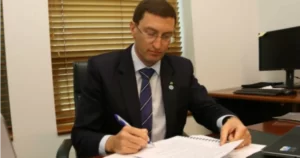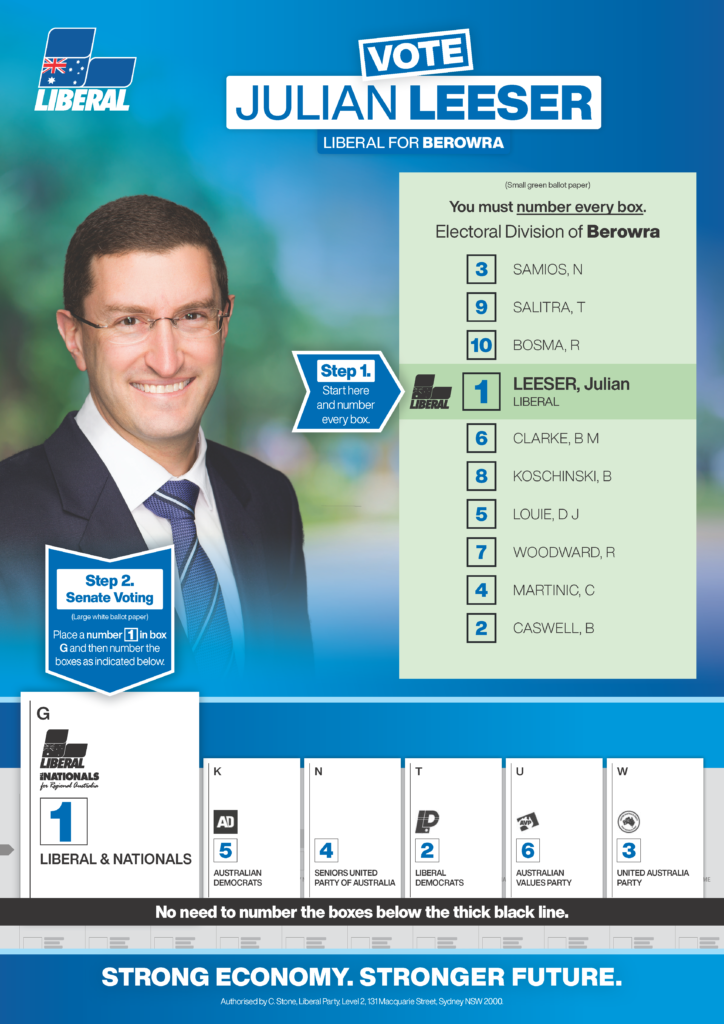JULIAN LEESER MP
ASHFIELD UNITING CHURCH
24 SEPTEMBER 2023
I begin by acknowledging the traditional owners, the Wangal people, and pay my respects to elders past, present and emerging.
Let me also acknowledge:
Your local Federal MP, Prime Minister Albanese.
Assistant Minister for Indigenous Australians, Senator Malarndirri McCarthy.
And my constituent and dear friend, Jim Mein, the former Moderator of the Uniting Church who has done so much to reconcile people of different faiths and backgrounds.
Rev Bill Crews, thank you for your warm invitation to join you here at the Ashfield Uniting Church.
It is wonderful to be here – I am a Jewish Australian, I was educated by Anglicans, and my best friend is a Muslim. Before entering Parliament I spent four years working for the largest mission of the Catholic Church, and I am often welcomed by prayers from my Buddhist friends in my electorate.
Some have accused me of hedging my bets in the after-life.
I have a deep and abiding respect and appreciation for what faith can do. How it can inspire people to do extraordinary things.
I spoke in Parliament about a woman named Katie – a Catholic woman, a woman who risked her life to save my family in the Holocaust.
Faith is the source of so much good.
The faith traditions that underpin our Australian life are the source of so much good – hospitals, schools, refuges, disability services and support for the homeless and crisis counselling.
What we call the Shechina – the spark of the divine – is expressed through good deeds.
Every religious tradition and culture has its stories of the divine meeting humanity.
In my own Jewish tradition, it is the flight from slavery to freedom expressed through the story of the Exodus which we retell every year at Passover.
In the Christian tradition, it is the healing of the lepers, and the sight being given to the blind man.
And here in Ashfield, we see one of those sparks of the divine, through that wonderful story of a day in 1989 when John Singleton went to the races.
Singo – that glorious irreverent Australian character.
On that day, everything Singo touched turned to gold.
Inspired, he turned up here in his Bentley with an almighty bag of cash and asked Bill “What could you do with it?”
And Bill said “I could start a soup kitchen”.
And Singo, the ad man, said “Call it the loaves and fishes”.
Bill, Jesus fed five thousand with his loaves and fishes on one day.
And you have been feeding people day in and day out for 35 years.
What a wonderful Australian story.
But Bill, and this church, offer more than a meal.
This church stops, sits and breaks bread with its guests, and this church.
You do the most important thing – you sit and listen. In listening, you affirm the God-given dignity of all who come to your table.
Listening. Respect. Generosity. Empathy.
They are some of life’s truest values.
In proposing a Voice, Indigenous leaders have put a question to us: will you stop, sit and listen
to us?
It doesn’t get more human and more personal than that.
That’s why we are here today.
Friends, the Prime Minister and I are from different faith traditions – he is a Catholic and I am a Jew, and we come from different political traditions – he is a son of the Labor Party, and I am a proud son of the Liberal Party.
But we are both here because we are united as Australians.
We are here to encourage Australians to sit and listen – to create a space in our national constitutional architecture where Indigenous Australians can be heard on the policies and laws that affect them.
We are here – people from across the political divide – because this is an important moment for our country that we want our country to grasp.
We are here in a Church which is an appropriate place to be in the context of a referendum. In the 1890s the churches played an active part in the debates about federation and many campaigned to achieve it.
During this debate on the Voice, I have found myself speaking about two things. Things so different but so interrelated.
The first, the words of the constitutional provision and the confidence Australians can have in those words.
And the second is about the importance of empathy in our national life.
Empathy – as you know here at Ashfield Uniting Church – is more than having a feeling of connection with people “just like us”.
That is not an understanding or a reckoning with difference, it’s not true empathy.
Empathy is bigger.
It’s not about accepting and embracing people because we can see ourselves in them.
It is about standing with people and their right to dignity, freedom, and self-expression when we can’t see the similarities.
You do it here in Ashfield every day – and it’s what we must do as a country.
And I believe we can.
Friends, tonight in my tradition is Yom Kippur – the Day of Atonement.
For Jewish people, this past week has been a time of reflection.
It is a sacred time.
A time to right-wrongs, and recommit to making the future better than the past. That’s what I’ve been thinking about.
Australians aren’t a perfect people. No people or nation is.
But Australians are a good-hearted people.
As a people, and as individuals, we have been on a journey – of knowing, of understanding and of reconciliation.
Of moving from being strangers from each other to being siblings of this great land.
Yes, it’s been long, slow, and hard journey, particularly for our Indigenous brothers and sisters.
But it is worth it.
We must stay on this journey.
If we do, we can begin to close the gaps that separate us in Indigenous health, housing, education and opportunity.
We can make a difference and take the next step in our journey.
A step that is about voice as well as listening.
A step that is about seeing each other our shared humanity – our God given human dignity – as so many of you have already done here in Ashfield.
I commend the wonderful work of this Church and thank you for your commitment to reconciliation and recognition through the Voice.
It has been an honour and a privilege to share this day with you.




